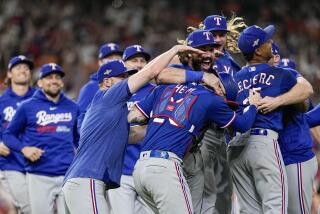Messier Keeps Eye on Prize : He’s 35, but Ranger Has Not Lost His Passion for Game
- Share via
NEW YORK — The eyes still have it.
Beneath a helmet that sits dangerously low on his brow, Mark Messier’s eyes blaze with an unquenchable passion. Whether by scoring a goal, slamming an opponent with a strategically placed elbow or delivering a stirring speech in the locker room, Messier exerts a winning influence on the New York Rangers.
“He has that look,” said St. Louis Blue goaltender Grant Fuhr, Messier’s teammate on the Edmonton Oilers’ five Stanley Cup-winning teams. “It says he means business. Mess always means business.”
The ferocity of his gaze hasn’t weakened, even though Messier turned 35 Thursday and will begin the second half of his 18th professional season tonight, when the Rangers play the Kings at Madison Square Garden.
Messier, who scored his 500th career goal Nov. 6, has climbed to sixth on the NHL’s career-scoring list with 1,435 points. After a spree of 23 points in 12 games before the All-Star break, he has 31 goals and 66 points, fifth in the scoring race. He’s on a 116-point pace, which would rank second only to the 129 points he scored for Edmonton in 1990, when he won the first of his two most valuable player awards.
Not bad, considering Ranger Coach Colin Campbell had projected his top center to score 17 goals this season.
“I didn’t think I was that old,” Messier said, laughing at Campbell’s miscalculation. “I think maybe he was trying to take a little pressure off me. I feel good. I felt good in training camp and as the season has gone on, everything has really come together.”
Messier thrives on pressure instead of being unnerved by it. He put potentially paralyzing pressure upon himself in 1994 when he predicted the Rangers, who were one loss from elimination in the playoff semifinals against the New Jersey Devils, would win the sixth game of that series. Not only did he make good on that vow, he recorded a hat trick, inspiring the Rangers to return home and win the decisive seventh game at the Garden.
But he wasn’t finished. After the Rangers lost the first game of the Cup finals, he called a players-only meeting and restored his teammates’ shaken confidence by telling them they would beat the Vancouver Canucks by playing more physically and tighter defensively. Messier united a team that had chafed under the iron rule of Coach Mike Keenan and led the Rangers to their first Cup in 54 years.
“You don’t often find people like Mark, who has the ability to move people with his words and also follow through with his play,” Ranger goalie Mike Richter said. “A big thing was made of him saying before Game 6 against New Jersey, ‘We’re going to win.’ Well, we did, because he scored three goals, and afterward you just shake your head and go, ‘Wow.’ He had done that so many times during the season, but to do it in the playoffs, in that situation, is something entirely different.
“One way or another, he’s just not going to let the team play below what it’s capable of. That’s a true measure of his talent. He’s not just a guy with natural physical gifts--he’s the most competitive athlete I’ve ever been around.”
Said Ranger General Manager Neil Smith, who acquired Messier from Edmonton in October, 1991: “Where there was a complete void of any kind of winning leadership or chemistry here, he was able to fill it and transformed what had been a perennially low-expectation, ready-to-lose organization into an organization that’s upset if we don’t win. I don’t think there’s anybody else who could have jumped into the void as he did.”
Although Fuhr said he long ago foresaw Messier becoming “a dominant force,” Messier never sought to become a leader. He inherited that role in Edmonton after the Oilers traded Wayne Gretzky to the Kings in 1988, and he instinctively took command of the Rangers when he arrived.
“It’s just things you learn through experience,” said Messier, who turned pro at 17 with the Indianapolis Racers of the World Hockey Assn. He was signed to replace Gretzky, whom the Racers sold to Edmonton. Messier joined Gretzky in Edmonton in 1979, after the WHA disbanded and the Oilers--one of four WHA teams absorbed by the NHL--chose him in the second round of the entry draft.
“I’ve had the opportunity to play with two great organizations and worked with some great leaders and great individuals,” Messier said. “Anybody who has been successful will tell you the person at the bottom of the totem pole in an organization is as important as the people at the top. I’ve never lost sight of that fact. It’s important to give everyone confidence.”
Gretzky also taught Messier how to remain focused and make the most of his hockey potential.
“He’s really the master of being able to concentrate, but also always finding the time to endorse and promote the game, and that’s an important part of it,” Messier said. “When you’re 18, 19, 20 years old you concentrate just on playing the game. The longer you’re in the league the more you realize there’s more to it. Nobody has been a better endorser than Wayne. I do as much as I can to promote the game off the ice and be productive on the ice.”
His example isn’t lost on the Rangers. “The greatest thing about him is his level of play is always so high. He never takes a game off or a shift off, and it takes real emotional toughness to do it every day,” Richter said. “He doesn’t let himself take a shortcut and he doesn’t let the team take a shortcut, and that’s the most valuable thing a leader can do.”
Still, Messier’s ability to maintain that excellence was questioned last spring after the Philadelphia Flyers defeated the Rangers in the second round of the playoffs. There was talk that 23-year-old Flyer center Eric Lindros, who is often called the next Messier because he also combines brute strength and scoring ability, had surpassed him. It was no cinch that the Rangers, who faced a late-December deadline to pick up Messier’s $6-million option for 1996-97 or buy him out, would want him back if his desire and productivity were waning.
It didn’t take long Smith to realize Messier’s hunger is as intense as ever and his scoring touch as sure.
“This may be the best he’s played in the five years he’s been here,” Smith said. “The great thing about Mark is people said he had a great year [last season] because of the carrot of a new contract in front of him. I don’t think so. I’ve seen him play well when he didn’t have a contract coming up. That doesn’t motivate him. What motivates him is winning. You can see a huge difference in him when he believes in his team and when he doesn’t, and he’s been like a little kid this year playing so hard and with such focus.
“When he got here, I said the organization will be different when he leaves, and I don’t think anybody will argue that.”
Messier isn’t thinking about hanging up his skates, although he welcomed the chance to relax for a few days at his home in Hilton Head, S.C., before playing in Saturday’s All-Star Game.
“I’m entering some years where I’m not sure what to expect. It’s uncharted waters,” he said. “I don’t feel I can do the same things as far as practicing every day, but the coaching staff has been fantastic about that. I feel strongly about the way I can compete and contribute, barring injuries. I feel as good as I ever have in my career so far.”
Fueled by a 16-0-4 streak at home, the Rangers vaulted into first place overall in the Eastern Conference and positioned themselves among the Cup favorites. Messier wouldn’t compare this team to the 1994 championship squad, but he likes the determination and talent he sees.
“I can’t remember a team here in New York that accepted its roles and played as well as we have lately,” he said. “I haven’t had to do much to motivate them; a lot of it has been self-motivated. That’s the one thing about this team, everyone comes to play. There are some off-nights, but not many.
“We’ve played extremely well as a team. We’ve been finding ways to win in all situations. When things are going like this, it’s a pleasure to come to the rink every day and play.”
That’s why the eyes still have it.
More to Read
Go beyond the scoreboard
Get the latest on L.A.'s teams in the daily Sports Report newsletter.
You may occasionally receive promotional content from the Los Angeles Times.







